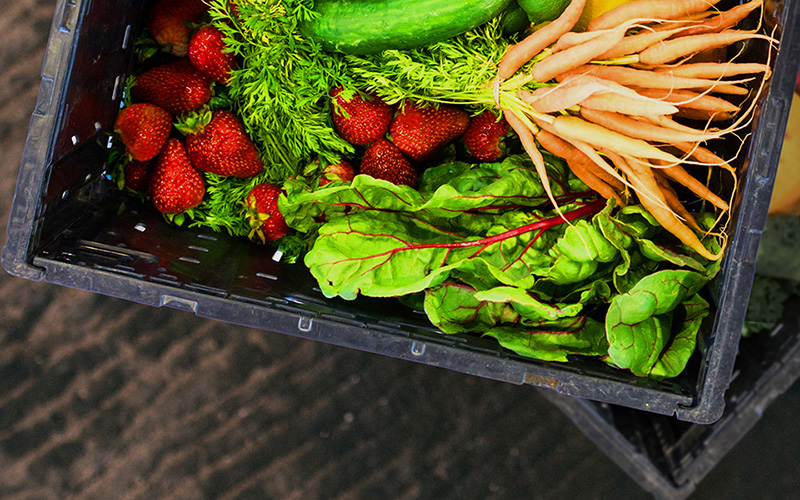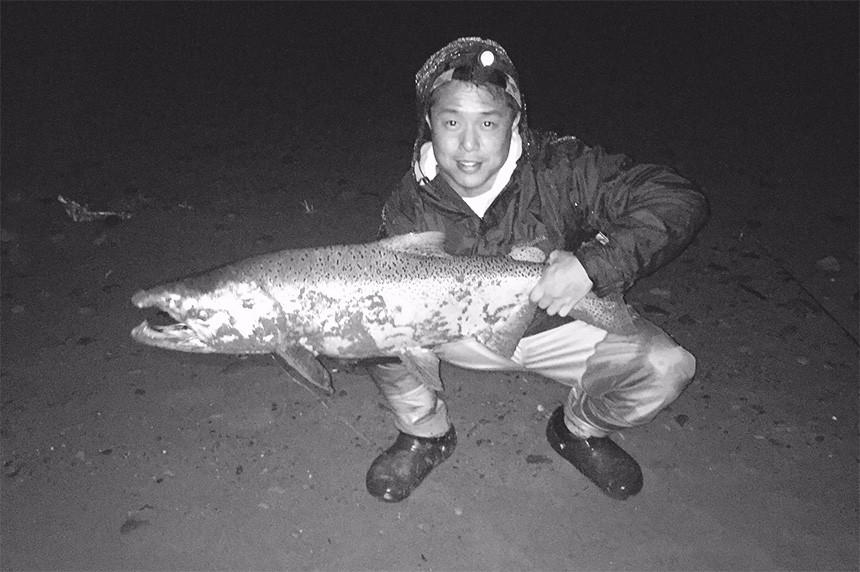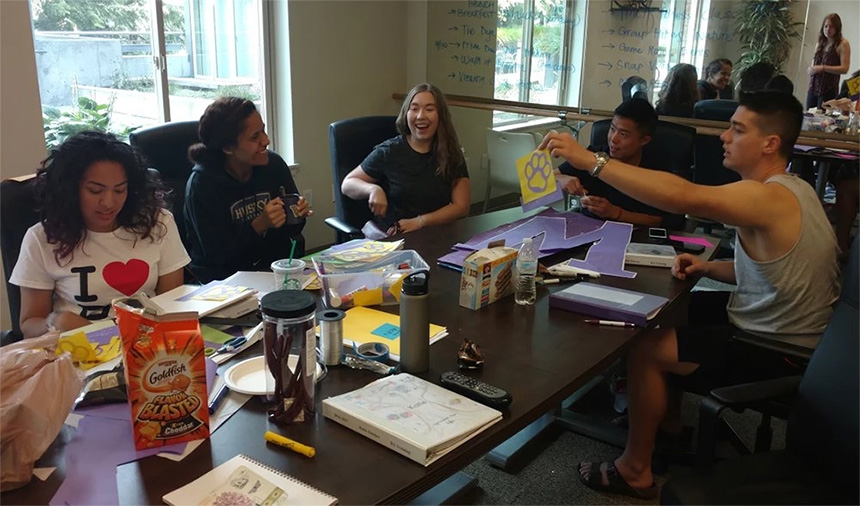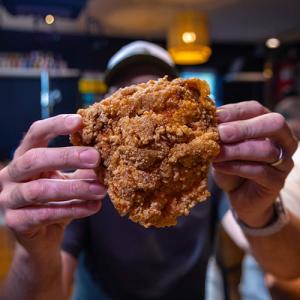
Building a Community Around Food
At Northwest Harvest, Urban Studies alumnus Chris Suh connects with people by remembering his own journey out of poverty.
Chris Suh is up before the sun. The pre-dawn hours are quiet. Suh’s gear rattles and clanks in the backseat as he pulls onto the gravel road. Suh parks the car, lets the engine idle for a moment. Warmth comes through the vents in a prolonged rasp. It’s cozy in here.
Suh turns the key.
The river isn’t far. Suh can hear the water moving. He straps a headlamp on and follows the beam to the shore. Suh opens his tackle box, pulls a corky and yarn from inside. Moments later both the ball shape corky and the brightly colored piece of yarn disappear with a plunk. Suh stands in the current while the hook sways in the darkness.
“I was not in a good place in life, so I started to make incremental changes,” said Suh. This included doing things he once enjoyed, like fishing. Suh caught a lot of fish that morning. He put them all back. For Suh, success was not going to be measured by what he reeled in. “I was feeling like, man, I finally did it,” he said. “I came out and did this all on my own.”
Wet, cold and maybe even a little hungry, yet happy.
Suh emerged from the Nisqually that day with purpose. “I just remember thinking that I could probably do other things now,” he said. “I also wondered, what if other people had an ‘a-ha’ moment on a river, but what if it no longer exists, what if these resources are gone?”

Copy and Paste
The youngest of two siblings, Suh graduated from Yelm High School in 2005. That fall he started at the University of Washington. “I wasn’t ready for school,” Suh said. “I wasn’t really ready for life.” Suh left the university and spent the next few years, in his own words, “jumping around and just trying to make ends meet.”
Suh returned to school a few years later, this time at Tacoma Community College (TCC) where he earned an associate’s degree. At this point, school felt like a box to check. Suh went to class and did the work but he didn’t see a larger purpose. So, instead of transferring to another institution to pursue a bachelor’s degree, Suh decided to take a break.
The next four years were sort of copy and paste for Suh. He worked, paid bills and generally tried to build a life for himself. “I hit a bunch of dead ends and learned a lot of hard lessons,” he said. “I tried to figure out a path that didn’t include higher education, but it just wasn’t happening.”
Connecting People to Places
Fishing is long periods of waiting punctuated by brief moments of suspense. The in-between is a regular rhythm of bobbing poles and lapping waves. The sport can’t help but be profound since oftentimes one’s only company is one’s own mind. Suh emerged from the water with a clarity he hadn’t known in a while. “I knew I wanted to do something that connected people and the places where they lived with natural resources, he said.
Suh did some research and came across UW Tacoma’s Urban Studies program (now the School of Urban Studies). He started at UW Tacoma in the fall of 2015 to pursue a degree in sustainable urban development. “I met a lot of people on campus who had stories that were similar to mine,” he said. “I just felt very welcomed.”
“The professors at UW Tacoma were so accessible and they all had practical, real-life experience that connected to what we were learning.”
— Chris Suh, ’17, Sustainable Urban Development
Suh found a home (literally) at UW Tacoma. He served as a resident advisor (RA) at Court 17 during his senior year. Food is an important part of Suh’s life. As such, he had an open-door policy for any of the students at Court 17. “People could knock on my door and they knew that I would feed them,” he said. Suh often hosted cooking-related events at the residence hall and worked with West Coast Grocery to have perishable food donated to Court 17 residents.

Life as a student and as an RA requires around-the-clock attention. Even so, Suh worked different jobs including as a cook and construction laborer. “Then I was able to take a contract job doing consulting work for minority-owned businesses with the City of Tacoma,” he said.
Suh graduated from UW Tacoma in June of 2017. Soon after he took a position in the City of Tacoma’s Housing Division. “I oversaw community development block grants,” said Suh. “The U.S. Department of Housing and Urban Development provides these grants to organizations to help keep lower-income folks in their homes.”
The work spoke to Suh’s commitment to equity. Still, he wanted to find something in the world of food justice. “I love to build a sense of connection with folks through food,” he said. “A community built around food has always been something that’s culturally relevant to me.”
Food as a Human Right
So much of fishing is about finding the right spot. Getting there can take time and can even be frustrating, but ultimately rewarding once you find that place. Suh found his, not in a river, but at Northwest Harvest. The non-profit organization supports food banks in Washington as part of its effort to address hunger. Suh is the Movement Building Manager. “This is a newer position that is meant to be part of a movement to get the state of Washington to look at food as a basic human right,” he said.
Suh’s role matches his personal belief system. “I know what it’s like to have a credit card declined, to get a shutoff notice, to dodge your landlord because you don’t have rent,” he said. “I also know that it’s not tied to laziness or a desire to not want to do those things. People struggle in many different ways, and so, I know, for me, if it weren’t for some of the second and third and fourth chances that I received, that I wouldn’t be where I am today.”
(Evening on KING 5 recently featured Chris Suh talking about his experiences with food insecurity.)
Recent news
Main Content
Educated Palate
Main Content
Lawless Honored with Governor’s Student Civic Leadership Award
Main Content
Towards the Functional Characterization of All Human Genes
UW Tacoma in the News
Main Content
Minnesota adoptees respond to fraud reports in South Korean adoption programs
Main Content
What’s next for The Swiss? Upcoming workshop to tackle how to best use iconic site
Main Content
Local Leaders Recognized at UW Tacoma’s Business Leadership Awards
Contact Information
- Phone: 253-692-5880
- Email: uwturban@uw.edu
- Urban Studies, School of (directory)



